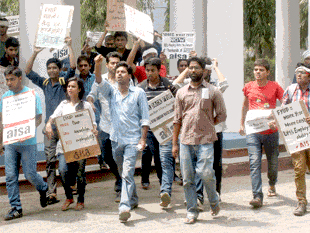
Vice Chancellor Dinesh Singh said in a statement that the university had decided to roll back the four-year undergraduate programme (FYUP).
Fresh admissions will now begin under the scheme of course that were in force in the 2012-13 academic session in all colleges of the university, he said in a statement.
"It is expected that the principals of our colleges shall assist in devising and ensuring a speedy completion of the admission process," the statement said.
Dinesh Singh said Delhi University realised that "it is of paramount importance" to protect student interests by starting the admission process stalled by the row between the university and the UGC.
An UGC official earlier said that Delhi University had agreed to revert to the three-year undergraduate course "very soon".
Admissions to the university's colleges for the current academic session which were to begin Tuesday got stalled, affecting tens of thousands of students, after the UGC told the university to drop the FYUP.
The four-year course had run into major opposition from some student and teacher groups, including those affiliated to the ruling Bharatiya Janata Party.
Earlier, amid the standoff between the university and the University Grants Commission, Human Resource Development Minister Smriti Irani made it clear that student interests needed to be protected at all costs.
She asked all players not to stand on "prestige" and said: "This is the time for statesmanship."
This story has not been edited by Firstpost staff and is generated by auto-feed.







Comments
Add new comment